Thiruvananthapuram
Thiruvananthapuram (/ˌtɪruːvəˌnʌntəˈpʊərəm/; Malayalam: [t̪iɾuʋɐnɐn̪d̪ɐpuɾɐm] (![]() listen)), also known by its former name Trivandrum (/trɪˈvændrəm/),[8] is the capital of the Indian state of Kerala. It is the most populous city in Kerala with a population of 957,730 as of 2011.[3] The encompassing urban agglomeration population is around 1.68 million.[5] Located on the west coast of India near the extreme south of the mainland, Thiruvananthapuram is a major information technology hub in Kerala and contributes 55% of the state's software exports as of 2016.[9][10] Referred to by Mahatma Gandhi as the "Evergreen city of India",[11][1] the city is characterised by its undulating terrain of low coastal hills.[12]
listen)), also known by its former name Trivandrum (/trɪˈvændrəm/),[8] is the capital of the Indian state of Kerala. It is the most populous city in Kerala with a population of 957,730 as of 2011.[3] The encompassing urban agglomeration population is around 1.68 million.[5] Located on the west coast of India near the extreme south of the mainland, Thiruvananthapuram is a major information technology hub in Kerala and contributes 55% of the state's software exports as of 2016.[9][10] Referred to by Mahatma Gandhi as the "Evergreen city of India",[11][1] the city is characterised by its undulating terrain of low coastal hills.[12]
Thiruvananthapuram | |
|---|---|
Metropolis | |
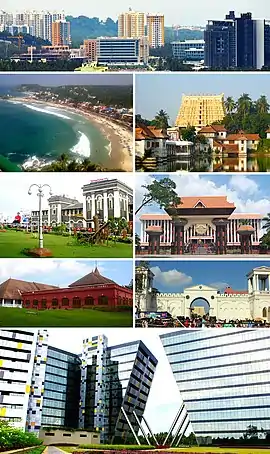 Clockwise, from top: View of Kulathoor, Padmanabhaswamy Temple, Niyamasabha Mandiram, East Fort, Technopark, Kanakakkunnu Palace, Thiruvananthapuram Central and Kovalam Beach | |
 Seal | |
| Nickname(s): Evergreen City of India God's Own Capital[1] | |
 Thiruvananthapuram  Thiruvananthapuram | |
| Coordinates: 08°29′15″N 76°57′9″E | |
| Country | |
| State | |
| District | Thiruvananthapuram |
| Government | |
| • Type | Municipal Corporation |
| • Body | Thiruvananthapuram Municipal Corporation |
| • Mayor | Arya Rajendran[2] (CPI(M)) |
| • Deputy Mayor | P. K. Raju (CPI) |
| • Member of Parliament | Shashi Tharoor (INC) |
| • City Police Commissioner | Sanjay Kumar Gurudin IPS |
| Area | |
| • Metropolis | 214 km2 (83 sq mi) |
| • Metro | 311 km2 (120 sq mi) |
| • Rank | 1st |
| Elevation | 10 m (30 ft) |
| Population (2011)[3] | |
| • Metropolis | 957,730 |
| • Density | 4,500/km2 (12,000/sq mi) |
| • Metro | 1,687,406 |
| Demonym(s) | Trivandrumite,[6] Trivian |
| Languages | |
| • Official Language | Malayalam, English[7] |
| Time zone | UTC+5:30 (IST) |
| Postal Index Number | 695 XXX |
| Area code | +91-(0)471 |
| Vehicle registration |
|
| Climate | Am/Aw (Köppen) |
| Website | trivandrum |
The present regions that constitute Thiruvananthapuram were ruled by the Ays who were feudatories of the Chera dynasty.[13] In the 12th century, it was conquered by the Kingdom of Venad.[13] In the 18th century, the king Marthanda Varma expanded the territory, founded the princely state of Travancore, and made Thiruvananthapuram its capital.[14] Travancore became the most dominant state in Kerala by defeating the powerful Zamorin of Kozhikode in the battle of Purakkad in 1755.[15] Following India's independence in 1947, Thiruvananthapuram became the capital of Travancore-Cochin state and remained so until the new Indian state of Kerala was formed in 1956.[16]
Thiruvananthapuram is a notable academic and research hub and home to the University of Kerala, APJ Abdul Kalam Technological University, the regional headquarters of Indira Gandhi National Open University, and many other schools and colleges. Thiruvananthapuram is also home to research centers such as the National Institute for Interdisciplinary Science and Technology, Indian Space Research Organisation's Vikram Sarabhai Space Centre, the Indian Institute of Space Science and Technology, National Centre for Earth Science Studies and a campus of the Indian Institutes of Science Education and Research.[17] The city is home to media institutions like Toonz India Ltd and Tata Elxsi Ltd, and is also home to Chitranjali Film Studio, one of the first film studios in Malayalam Cinema, and Kinfra Film and Video Park at Kazhakoottom, which is India's first Infotainment industrial park.[18]
Being India's largest city in the deep south, it is strategically prominent and hosts the Southern Air Command headquarters of the Indian Air Force, the Thumba Equatorial Rocket Launching Station and the upcoming Vizhinjam International Seaport. Thiruvananthapuram is a major tourist centre, known for the Padmanabhaswamy Temple, the beaches of Kovalam and Varkala, the backwaters of Poovar and Anchuthengu and its Western Ghats tracts of Ponmudi and the Agastya Mala. In 2012, Thiruvananthapuram was named the best Kerala city to live in, by a field survey conducted by The Times of India.[19] In 2013, the city was ranked the fifteenth best city to live in India, in a survey conducted by India Today.[20] Thiruvananthapuram was ranked the best Indian city for two consecutive years, 2015 and 2016, according to the Annual Survey of India's City-Systems (ASICS) conducted by the Janaagraha Centre for Citizenship and Democracy.[21] The city was also selected as the best governed city in India in a survey conducted by Janaagraha Centre for citizenship and democracy in 2017.[22]
Etymology
The city takes its name from Malayalam word thiru-anantha-puram (തിരുവനന്തപുരം [t̪iɾuʋɐnɐn̪d̪ɐpuɾɐm] (![]() listen)), meaning "The City of Lord Ananta",[23] referring to the deity of the Sri Padmanabhaswamy Temple located in the city. Thiruvananthapuram is also known in literature, and popular reference as Ananthapuri, derived from the Sanskrit word Syanandurapuram, meaning "The City of Bliss" in Carnatic kirtanas composed by Swathi Thirunal, erstwhile Maharaja of Travancore.[24] The city was officially referred to as Trivandrum until 1991 (Trivandrum being the anglicised name of the town), when the government decided to reinstate the city's original name Thiruvananthapuram.[25]
listen)), meaning "The City of Lord Ananta",[23] referring to the deity of the Sri Padmanabhaswamy Temple located in the city. Thiruvananthapuram is also known in literature, and popular reference as Ananthapuri, derived from the Sanskrit word Syanandurapuram, meaning "The City of Bliss" in Carnatic kirtanas composed by Swathi Thirunal, erstwhile Maharaja of Travancore.[24] The city was officially referred to as Trivandrum until 1991 (Trivandrum being the anglicised name of the town), when the government decided to reinstate the city's original name Thiruvananthapuram.[25]
History
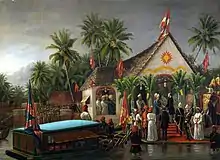
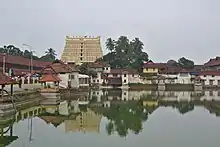
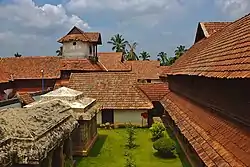
Thiruvananthapuram is a relatively modern region with trading traditions dating back to 1000 BCE.[26][27] It is believed that the ships of King Solomon landed in a port called Ophir (now Poovar) in Thiruvananthapuram in 1036 BCE.[28][29] The city was the trading post of spices, sandalwood and ivory.[30] However, the ancient political and cultural history of the city was almost entirely independent from that of the rest of Kerala.
The Chera dynasty governed the area of Malabar Coast between Alappuzha in the south to Kasaragod in the north. This included Palakkad Gap, Coimbatore, Salem, and Kolli Hills. The region around Coimbatore was ruled by the Cheras during Sangam period between c. first and the fourth centuries CE and it served as the eastern entrance to the Palakkad Gap, the principal trade route between the Malabar Coast and Tamil Nadu.[31] However the southern region of present-day Kerala state (The coastal belt between Thiruvananthapuram and Alappuzha) was under Ay dynasty, who was more related to the Pandya dynasty of Madurai.[32]
The early rulers of the city were the Ays. Vizhinjam, which is now a region in the present-day Thiruvananthapuram, was the capital of the Ay dynasty.[33] Vizhinjam was an important port city from as early as the second century BC.[34][35] During the Ay dynasty's rule, Thiruvananthapuram witnessed many battles in which the Chola and Pandyan dynasties attempted to capture the port town.[36][37]
After the death of king Vikramaditya Varaguna in 925 AD, the glory of the Ays departed and almost all their territories became part of the Chera dynasty.[38][13] During the tenth century, the Cholas attacked and sacked Vizhinjam and surrounding regions.[13] The port in Vizhinjam and the historic education center of Kanthalloor Sala were also destroyed by Cholas during this period.[39][40] A branch of the Ay family, which had controlled the Padmanabhaswamy Temple, merged with the Kingdom of Venad in the 12th century.[13]
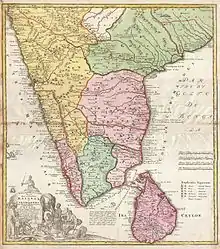
Present-day Thiruvananthapuram city, district, and Kanyakumari district, were parts of the Ay dynasty during ancient and medieval ages, which was a Tamil kingdom based in the southernmost part of the Indian subcontinent.[41] Ay kingdom had experienced attacks and conquests by Cholas and Pandyas in various periods.[41] Later it became a part of Venad in late Middle Ages, which was eventually expanded as the powerful kingdom of Travancore in 18th century CE.[41] The Tamil-Dravidian kind of architecture is also found in Padmanabhaswamy temple, which makes it distinct and unique from the architectural style of temples in northern and central parts of Kerala.[41]
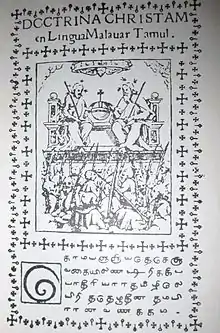
Modern-day Southern Kerala (The districts like Thiruvananthapuram, Kollam, Pathanamthitta, etc.) had been ruled by Tamil dynasties such as the Ay kingdom, the Pandya dynasty,[42][43] and the Chola dynasty,[44][45] for a long time until 16th–17th century CE. The official language of Venad, based at Kollam, was also identified as Tamil, by the natives of Venad in those times.[46] The place names, the dialects of Malayalam spoken, and the customs that exist in the southern parts of Kerala still reveal a close relationship with Tamil heritage.[47] Malayalam became more prevalent with the expansion of Venad into Travancore by annexing the regions up to present-day Ernakulam district.
In the early 18th century CE, the Travancore royal family adopted some members from the royal family of Kolathunadu based at Kannur, and Parappanad based in present-day Malappuram district.[48] Then, Marthanda Varma who inherited the Kingdom of Venad expanded the kingdom by conquering the kingdoms of Attingal, Kollam, Kayamkulam, Kottarakara, Kottayam, Changanassery, Meenachil, Poonjar and Ambalapuzha. In 1729, Marthanda Varma founded the princely state of Thiruvithamkoor and Thiruvananthapuram was made the capital in 1795 after shifting the capital from Padmanabhapuram in Kanyakumari district.[49] Thiruvananthapuram became a prominent city in Kerala under Marthanda Varma.[50]
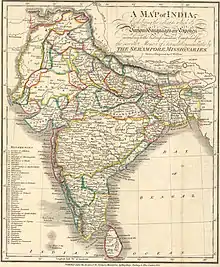
As a result of the annexation of neighbouring chiefdoms, the artists and scholars from these places migrated to Thiruvananthapuram, turning it into a cultural center. Marthanda Varma gave patronage to different temple art forms including Koothu, Padhakam, Kathakali, Thullal, and Koodiyattam. Noted artists such as Ramapurathu Warrier and Kunchan Nambiar amongst others served as his court poets.[51] Travancore became the most dominant state in Kerala by defeating the powerful Zamorin of Kozhikode in the battle of Purakkad in 1755.[15]
The city developed into a significant intellectual and artistic centre during this period. The city's golden age was during the mid-19th century under the reign of Maharaja Swathi Thirunal and Maharaja Ayilyam Thirunal. This era saw the establishment of the first English school (1834), the Observatory (1837), the General Hospital (1839), the Oriental Research Institute & Manuscripts Library and the University College (1873). The first mental hospital in the state was started during the same period. Sanskrit College, Ayurveda College, Law College and a second-grade college for women were started by Moolam Thirunal (1885–1924).[52]
The early 20th century was an age of tremendous political and social changes in the city. The Sree Moolam Popular Assembly, established in 1904, was the first democratically elected legislative council in any Indian state.[53] Despite not being under the direct control of the British Empire at any time, the city featured prominently in India's freedom struggle. The Indian National Congress had a very active presence in Thiruvananthapuram. A meeting of the Indian National Congress presided by Dr Pattabhi Sitaramaiah was held here in 1938.

The Thiruvananthapuram Municipality came into existence in 1920 as the first municipality in the Travancore region. The municipality was converted into a corporation on 30 October 1940, during the period of Chitra Thirunal Bala Rama Varma, who took over in 1931.[55] The city witnessed multi-faceted progress during his period. The promulgation of the "Temple Entry Proclamation" (1936) was an act that underlined social emancipation. This era also saw the establishment of the University of Travancore in 1937, which later became Kerala University.[56]
With the end of British rule in 1947, Travancore chose to join the Indian union. The first popularly elected ministry, headed by Pattom Thanu Pillai, was installed in office on 24 March 1948. In 1949, Thiruvananthapuram became the capital of Thiru-Kochi, the state formed by the integration of Travancore with its northern neighbour, the Kochi.[57] The king of Travancore, Chitra Thirunal Bala Rama Varma, became the Rajpramukh of the Travancore-Cochin Union from 1 July 1949 until 31 October 1956. When the state of Kerala was formed on 1 November 1956, Thiruvananthapuram became its capital.[58]
With the establishment of Thumba Equatorial Rocket Launching Station (TERLS) in 1962, Thiruvananthapuram became the cradle of India's ambitious space programme. The first Indian space rocket was developed and launched from the Vikram Sarabhai Space Centre (VSSC) in the outskirts of the city in 1963. Several establishments of the Indian Space Research Organisation (ISRO) were later established in Thiruvananthapuram.[59]
A significant milestone in the city's recent history was the establishment of Technopark—India's first IT park—in 1995.[60] Technopark has developed into the largest IT park in the geographical area,[61] employing around 62,000 people in 450 companies.[62]
Geography and climate
Geography
Thiruvananthapuram is built on seven hills[63] by the seashore and is at 8.5°N 76.9°E on the west coast, near the southern tip of mainland India.[64] The city is on the west coast of India and is bounded by the Laccadive Sea to its west and the Western Ghats to its east. The average elevation of the city is 16 ft (4.9 m) above sea level.[65] The Geological Survey of India has identified Thiruvananthapuram as a moderately earthquake-prone urban centre and categorised the metropolis in the Seismic III Zone.[66] Thiruvananthapuram lies on the shores of Karamana and Killi rivers. Vellayani, Thiruvallam and Aakulam backwaters lie in the city.[67] The soil type in the middle part of the city is a dark brown loamy laterite soil high in phosphates. Laterisation is a result of the heavy rainfall and humid conditions. In western coastal regions of the city, sandy loam soil is found, and on hilly eastern parts of the district, rich dark brown loam of granite origin is found.[68]
The Thiruvananthapuram Corporation is spread over 214.86 km2 (82.96 sq mi).[3] The wider Thiruvananthapuram metropolitan area comprises Thiruvananthapuram corporation, three municipalities and 27 panchayats, as of 2011.[69] Being the largest city in India's southern tip region, it is essential for both military logistics and civil aviation in the southern part of the country. Thiruvananthapuram is the headquarters of the Southern Air Command (SAC) of the Indian Air Force.[70]
Climate
The city has a climate that lies on the border between a tropical savanna climate (Köppen Aw) and a tropical monsoon climate (Am). As a result, its only distinct seasons relate to rainfall rather than temperature. The mean maximum temperature is 34 °C (93 °F) and the mean minimum temperature is 21 °C (70 °F). The humidity is high and rises to about 90% during the monsoon season.[71] Thiruvananthapuram is the first city along the path of the south-west monsoons and gets its first showers in early June. The city receives heavy rainfall of around 1,835 millimetres (72.2 in) per year. The city also gets rain from the receding north-east monsoons which hit the city by October. The dry season sets in by December. The lowest temperature recorded in the city core was 17.8 °C (64.0 °F) on 6 January 1974 and the highest temperature was 38.2 °C (100.8 °F) on 21 February 2019.[72] At the airport, the lowest temperature recorded was 16.4 °C (61.5 °F) on 15 January 1975 and the highest temperature was 36.3 °C (97.3 °F) on 5 May 1998.[72]
| Climate data for Thiruvananthapuram City (1991–2020, extremes 1901–2020) | |||||||||||||
|---|---|---|---|---|---|---|---|---|---|---|---|---|---|
| Month | Jan | Feb | Mar | Apr | May | Jun | Jul | Aug | Sep | Oct | Nov | Dec | Year |
| Record high °C (°F) | 36.0 (96.8) |
38.2 (100.8) |
37.7 (99.9) |
38.0 (100.4) |
36.7 (98.1) |
35.8 (96.4) |
34.0 (93.2) |
34.6 (94.3) |
35.4 (95.7) |
35.2 (95.4) |
34.8 (94.6) |
35.5 (95.9) |
38.2 (100.8) |
| Mean maximum °C (°F) | 34.4 (93.9) |
34.8 (94.6) |
35.4 (95.7) |
35.1 (95.2) |
34.6 (94.3) |
32.8 (91.0) |
32.1 (89.8) |
32.3 (90.1) |
33.0 (91.4) |
32.8 (91.0) |
33.1 (91.6) |
34.1 (93.4) |
35.9 (96.6) |
| Average high °C (°F) | 32.4 (90.3) |
32.8 (91.0) |
33.5 (92.3) |
33.3 (91.9) |
32.6 (90.7) |
30.4 (86.7) |
30.1 (86.2) |
30.3 (86.5) |
30.9 (87.6) |
30.9 (87.6) |
31.0 (87.8) |
32.0 (89.6) |
31.7 (89.1) |
| Daily mean °C (°F) | 27.4 (81.3) |
27.8 (82.0) |
28.9 (84.0) |
29.2 (84.6) |
28.9 (84.0) |
27.1 (80.8) |
26.7 (80.1) |
26.9 (80.4) |
27.2 (81.0) |
27.2 (81.0) |
27.1 (80.8) |
27.3 (81.1) |
27.6 (81.7) |
| Average low °C (°F) | 22.3 (72.1) |
22.9 (73.2) |
24.3 (75.7) |
25.1 (77.2) |
25.1 (77.2) |
23.8 (74.8) |
23.3 (73.9) |
23.4 (74.1) |
23.5 (74.3) |
23.5 (74.3) |
23.2 (73.8) |
22.6 (72.7) |
23.6 (74.5) |
| Mean minimum °C (°F) | 20.2 (68.4) |
20.9 (69.6) |
22.1 (71.8) |
23.0 (73.4) |
22.6 (72.7) |
22.0 (71.6) |
21.7 (71.1) |
21.8 (71.2) |
22.1 (71.8) |
22.1 (71.8) |
21.6 (70.9) |
20.3 (68.5) |
19.7 (67.5) |
| Record low °C (°F) | 17.8 (64.0) |
18.1 (64.6) |
20.2 (68.4) |
20.0 (68.0) |
20.1 (68.2) |
20.0 (68.0) |
20.2 (68.4) |
18.2 (64.8) |
20.8 (69.4) |
20.1 (68.2) |
18.9 (66.0) |
18.2 (64.8) |
17.8 (64.0) |
| Average rainfall mm (inches) | 17.9 (0.70) |
21.7 (0.85) |
30.6 (1.20) |
122.3 (4.81) |
213.8 (8.42) |
307.8 (12.12) |
185.2 (7.29) |
161.0 (6.34) |
196.7 (7.74) |
297.2 (11.70) |
212.8 (8.38) |
68.4 (2.69) |
1,835.3 (72.26) |
| Average rainy days | 0.9 | 1.4 | 2.2 | 6.9 | 9.1 | 16.0 | 13.3 | 9.9 | 10.4 | 13.0 | 9.8 | 4.0 | 96.9 |
| Average relative humidity (%) (at 17:30 IST) | 64 | 63 | 66 | 73 | 75 | 80 | 79 | 77 | 77 | 80 | 78 | 69 | 73 |
| Average dew point °C (°F) | 21 (70) |
22 (72) |
23 (73) |
24 (75) |
24 (75) |
24 (75) |
24 (75) |
24 (75) |
24 (75) |
24 (75) |
24 (75) |
23 (73) |
23 (74) |
| Mean monthly sunshine hours | 260.4 | 248.6 | 254.2 | 201.0 | 192.2 | 129.0 | 136.4 | 164.3 | 180.0 | 173.6 | 165.0 | 217.0 | 2,321.7 |
| Mean daily sunshine hours | 8.4 | 8.8 | 8.2 | 6.7 | 6.2 | 4.3 | 4.4 | 5.3 | 6.0 | 5.6 | 5.5 | 7.0 | 6.4 |
| Average ultraviolet index | 11 | 12 | 12 | 12 | 12 | 12 | 12 | 12 | 12 | 12 | 11 | 10 | 12 |
| Source 1: India Meteorological Department (sun 1971–2000)[73][72][74] Time and Date (dewpoints, 2005-2015)[75] | |||||||||||||
| Source 2: Tokyo Climate Center (mean temperatures 1981–2010)[76] Weather Atlas[77] | |||||||||||||
Demographics
According to provisional results of the 2011 national census, the Corporation of Thiruvananthapuram, which occupies an area of 214 km2 (83 sq mi), had a population of 957,730.[3] The city's population density was 4,454/km2 (11,540/sq mi).[3] The Urban Agglomeration had a population of 1,687,406 in 2011.[5] The sex ratio is 1,040 females for every 1,000 males, which is higher than the national average.[3] Thiruvananthapuram's literacy rate of 93.72%[79] exceeds the all-India average of 74%.[80]
Malayalees form the vast majority of Thiruvananthapuram's population. Thiruvananthapuram's smaller communities are the Tamils and North Indians. According to the 2011 census, 68.5% of the population is Hindu, 16.7% Christian and 13.7% Muslims.[81] The remainder of the community includes Jains, Jews, Sikhs, Buddhists and other religions which account for 0.06% of the population; 0.85% did not state a belief in the census.[81]
Malayalam, the official state language, is the dominant language in Thiruvananthapuram City: English is also used, mainly by the white-collar workforce. Tamil has the most speakers after Malayalam. The city also has a few Tulu, Kannada, Konkani, Dhivehi, Telugu and Hindi speakers. As per the 2001 census, the population below the poverty line in the city was 11,667.[82]
Thiruvananthapuram has witnessed massive immigration of workers from northern India, mainly Punjab, Haryana, and Madhya Pradesh, and Eastern India, mainly West Bengal and Bihar, and from neighbouring countries like Sri Lanka, the Maldives, Nepal and Bangladesh.[83]
Administration

The Corporation of Thiruvananthapuram or TMC oversees and manages the civic infrastructure of the city's 100 wards.[84] Each ward elects a councillor to the Corporation of Thiruvananthapuram. TMC has the power to act as the local government of the city.[85] TMC is headed by the Mayor, who is elected from among the councillors. The Mayor is responsible for the overall supervision and control of the administrative functions of the TMC. The corporation discharges its services through standing committees.[85] The corporation secretary is an officer appointed by the government, who serves as the administrative head of the TMC and implements the council's decisions based on the resolutions adopted by the council. The functions of the Municipal Corporation are managed by seven departments—engineering, health, general administration, council, accounts and revenue.[86] For the decentralised role of TMC, eleven Zonal Offices are created. The zonal offices are in Fort, Kadakampally, Nemom, Ulloor, Attipra, Thiruvallom, Kazhakkuttom, Sreekaryam, Kudappanakunnu, Vattiyoorkavu and Vizhinjam.[87] The functions of the TMC include water supply, drainage and sewerage, sanitation, solid-waste management, and building regulation. The Thiruvananthapuram Development Authority is responsible for the statutory planning and development of the greater Thiruvananthapuram region.[88]
As the seat of the Government of Kerala, Thiruvananthapuram is home to not only the offices of the local governing agencies but also the Kerala Legislative Assembly and the state secretariat, which is housed in the Kerala Government Secretariat complex. Thiruvananthapuram has two parliamentary constituencies—Attingal and Thiruvananthapuram—and elects five Members of the Legislative Assembly (MLAs) to the state legislature.[89]
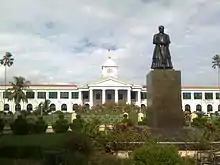
Law and order
The Thiruvananthapuram City Police is the main law-enforcement agency in the city. It is headed by a commissioner of police.[90] The Thiruvananthapuram city police is a division of the Kerala Police, and the administrative control lies with the Kerala Home Ministry. Thiruvananthapuram city police are the largest police division in Kerala, and it consists of ten Circle offices and 21 police stations and a sanctioned strength of 3,500 police personnel.[91] The Central Prison is the oldest prison in Kerala and the headquarters of Kerala prisons and correctional services.[92]
Military and diplomatic establishments
The Southern Air Command of the Indian Air Force is headquartered in the city.[93][94] There are two state armed police battalions and a unit of the Central Reserve Police Force (CRPF) based in Thiruvananthapuram.[95] The CRPF has a Group Headquarters (GHQ) located at Pallipuram.[96] In addition to this, three units of the Central Industrial Security Force (CISF) and Sector Headquarters (SHQ) of the Border Security Force (BSF) are also present. Thiruvananthapuram also houses a large army cantonment in Pangode which houses some regiments of the Indian Army.[97]
In the city there is a Consulate of the United Arab Emirates,[98] a Consulate of the Maldives,[99] and Honorary Consulates of Sri Lanka, Russia and Germany.[100][101]
Utility services
The Kerala Water Authority supplies the city with water that is sourced from the Karamana River;[102] most of it is drawn from the Aruvikkara and Peppara reservoirs, and it is treated and purified at the Aruvikkara pumping stations.[103] The Wellington Water Works, commissioned in 1933, is one of the oldest city water supply schemes in India.[104] The sewage water is treated at Muttathara sewage-treatment plant, which handles 32 million litres per day.[105][106] The city area is divided into seven blocks for the execution of the sewage system.[107] Electricity is supplied by the Kerala State Electricity Board.[108] Fire services are handled by the Kerala Fire And Rescue Services.[109]
Economy
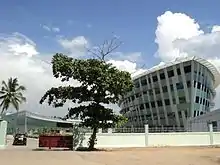
Thiruvananthapuram's economy comprises Information Technology, education, plantations, aerospace, commerce and tourism.[110] Thiruvananthapuram district contributes 10.31%, of the state's GDP.[9] With an economic growth rate of 13.83%, Thiruvananthapuram is the fastest-growing district in Kerala.[9] Thiruvananthapuram was listed as one of the top ten cities in India on Vibrancy and Consumption Index by a study conducted by global financial services firm Morgan Stanley.[111] State- and central-government employees make up a large percentage of the city's workforce.[9] Thiruvananthapuram is a major aerospace research centre in India. The Vikram Sarabhai Space Centre, the most significant and leading centre of ISRO,[112] and several space-related, state-owned ISRO centres such as Thumba Equatorial Rocket Launching Station, Liquid Propulsion Systems Centre, and ISRO Inertial Systems Unit are based in Thiruvananthapuram.[113] The BrahMos Aerospace Trivandrum Limited is one of the leading missile integration and defence production units in India.[114] Other enterprises include Travancore Titanium Products, Kerala Automobiles Limited, MILMA, English Indian Clays, Keltron, Trivandrum Rubber Works and HLL Lifecare Limited.
Thiruvananthapuram is a major IT and ITES hub in India. The city contributes around 55% of Kerala's total software exports.[9][115] Thiruvananthapuram houses major multinational Technology companies like Oracle Corporation, Nissan, Allianz Technology, Envestnet, Tata Consultancy Services, Infosys, Toonz Animation India, UST Global, Ernst & Young, Flytxt, Navigant, Tata Elxsi, McKinsey & Company, RR Donnelly and Quest Global.[116] Technopark is the largest information-technology park in India in terms of built-up area.[117] It is the largest employment base campus in Kerala with 52,000 IT/ITES professionals and about 400 companies.[9][116] Other IT, media and industrial campuses include Kinfra Film and Video Park, Kinfra Apparel Park, B-HUB and Chithranjali Film Complex.[118][119] Several new IT, biotechnology and industrial campuses like Technocity and Bio 360 Life sciences park are under construction.[120][121]
Tourism is a significant economic sector.[122][123][124] The presence of natural attractions like beaches, backwaters, hills, and plantations and attractions like heritage, history, Ayurveda, medical tourism and knowledge centres attract many tourists.[125] The city experienced a surge of investment in the real estate, infrastructure and retail sectors in 2016–17.[126]
Port-related activity is low mainly due to the underdevelopment of ports. Vizhinjam International Seaport is a transhipment port under construction.[127] Vizhinjam port's location is close to the international shipping routes and, it is just 10–12 nautical miles from the busy Persian Gulf-Malacca shipping lane.[128] The port also has a natural depth of 18 to 20 metres which can accommodate huge container ships.[129] The berths at Vizhinjam port are designed to cater to vessels of up to 24,000 TEU.[130]
Tourism

Thiruvananthapuram is a major tourist hub in India.[123] Kovalam and Varkala are popular beach towns near the city. Other important beaches include Poovar, Shankumugham Beach, Azhimala Beach, Vizhinjam Beach and Veli Beach. The Padmanabhaswamy Temple located at the heart of the city is known as the richest place of worship in the world.[131] Other places of interest include Agasthyamala rain forests, Neyyar Wildlife Sanctuary, Kallar, Braemore, Ponmudi hills, Poovar, Anchuthengu backwaters, Varkala Cliffs and Kappil-Edava lakes.
The city is also known for its unique style of architecture involving Kerala Architecture with British and Dravidian influences.[132] Napier museum, Thiruvanathapuram Zoo, Padmanabha Swamy temple, Kuthira Malika palace, Kilimanoor palace and The Thiruvananthapuram Golf Club heritage building are examples of this.
The main museums include Kerala Science and Technology Museum (with its attached Priyadarsini Planetarium), Napier Museum, Kerala Soil Museum and Koyikkal Palace Museum. Agasthyamala Biosphere Reserve is listed in UNESCO's World Network of Biosphere Reserves.[133]
Culture
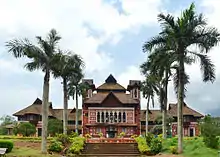
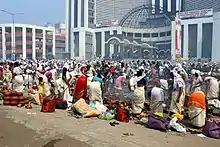
Thiruvananthapuram is known as the "Evergreen City of India" because of its green landscapes and the presence of many public parks.[1][134] Thiruvananthapuram has historically been a cultural hub in South India due to the development of arts, architecture and liberal customs by the rulers of erstwhile Thiruvananthapuram. As a testimony to this, renowned artists like Maharaja Swathi Thirunal and Raja Ravi Varma hail from the city.[135][136] Prominent social reformers such as Sri Narayana Guru, Chattampi Swamikal, Ayyankali, Vakkom Moulavi and C. V. Raman Pillai also are from Thiruvananthapuram.[137]
Two of the three Malayalam triumvirate poets, Ulloor S. Parameswara Iyer and Kumaran Asan are from Thiruvananthapuram.[138][139] Annual literature festivals like the Kovalam Literary Festival, are held in the city.[140] Literary development is further aided by state institutions such as the State Central Library, one of the oldest public libraries in India, which was established in 1829,[141] and other major libraries including the Thiruvananthapuram Corporation Central library, and the Kerala University Library.[142] Thiruvananthapuram has been a hub of classical music since the days of Maharaja of Travancore, Swathi Thirunal.[143][144] Thiruvananthapuram is known for many music festivals like the Navarathri Music Festival, one of the oldest festivals of its kind in South India,[143] Swathi Sangeethotsavam, Soorya Music fest, Neelakanta Sivan Music Fest and many other music festivals are organised by various cultural groups.[143] The 111-day-long Soorya Festival is the biggest art and cultural event in Kerala.[145][146] The Soorya Festival features film festivals, theatre festivals, dance, music, painting and photography exhibitions.[145]
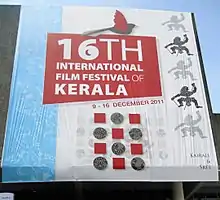
The Malayalam film Industry was started in Thiruvananthapuram. The first Malayalam feature film, Vigathakumaran directed by J. C. Daniel was released in Thiruvananthapuram.[147] J. C. Daniel is considered the father of Malayalam film industry. He also established the first film studio in Kerala, the Travancore National Pictures at Thiruvananthapuram in 1926.[148][149] The International Film Festival of Kerala (IFFK), which is held every year in December, is one of Asia's largest film festivals in terms of viewer participation.[150][151] In addition to various film festivals, the presence of the Central Board of Film Certification's regional office, many movie studios and production facilities like the Uma Studio, Chitranjali Studio, Merryland Studio, Kinfra Film and Video Park and Vismayas Max contribute to the growth of Thiruvananthapuram as a centre of cinema.[152][153]
Apart from the famous Padmanabhaswamy Temple, the city's architecture is championed by the Napier Museum and Thiruvananthapuram Zoo, one of the oldest zoos in India.[154] Other architectural landmarks include Kuthira Malika Palace, Kowdiar Palace, Attukal temple, Beemapally Mosque, Connemara Market, and the Mateer Memorial Church. Thiruvananthapuram was the main centre of Laurie Baker's architecture.[155]
Along with the major festivals of Onam, Vishu, Deepavali, and Navaratri, Christian and Islamic festivals like Christmas, Eid ul-Fitr, Bakrid and Milad-e-sheriff, the diverse ethnic populace of the city celebrates several local festivals like Attukal Pongala,[156] Beemapally Uroos,[157] Vettukaad Church Festival,[158] Padmanabhaswamy Temple Aaraattu and Lakshadeepam festival.[159] During the Onam festival, the state government conducts several cultural events for a week in the city.[160] The Attukal Pongala festival attracts millions of women devotees from across India and abroad. It is the largest gathering of women in the world.[161][162] Germany's Goethe Zentrum, France's Alliance Française and Russia's Gorky Bhavan centres host a wide range of events and programmes throughout the year.[163][164][165]
The general cuisine of the people is Keralite cuisine, which is generally characterised by an abundance of coconut and spices. Other South Indian cuisines, as well as Chinese and North Indian cuisines, are popular.[166] Thiruvananthapuram has many restaurants offering Arabic, Italian, Thai and Mexican cuisines.[167][168]
Transport
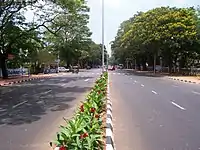
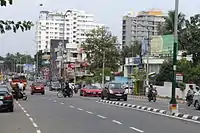
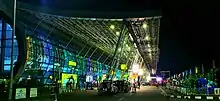
Public transport
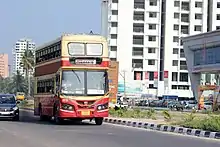
The majority of bus services are conducted by government operators. There are also private operators.[169] The city buses operated by Kerala State Road Transport Corporation (KSRTC) are an important and reliable means of public transport available in the city. The main bus stations in the city are the Central Bus Station in Thampanoor, where most of the long-distance buses ply from, and the city bus station in East Fort, where most city buses ply from.[170][171] Three-wheeled, yellow and black auto-rickshaws and taxis, are other popular forms of public transport.[172][173] Thiruvananthapuram Light Metro is a fully elevated metro rail – rapid transit system planned to ease the congestion in the city.[174][175]
Road
Thiruvananthapuram has a well-developed road transport infrastructure.[174] The roads in the city are maintained by the Thiruvananthapuram Roads Development Company Limited (TRDCL) and Kerala PWD.[176] TRDCL manages the 42 km city roads which come under the Thiruvananthapuram City Roads Improvement Project (TRCIP), which is the first urban road project in India.[177][178] TRCIP is a Public-private partnership project to improve and maintain the existing road network in the city to cater to the needs of rapid urbanisation.[177] TRCIP has won the International Road Federation's Global Road Achievement Awards in 2015.[179] TCRIP has also been selected by United Nations as a replicable Public Private Partnership model.[180] It was one of the 12 Public-private partnership project case studies from across the world which fulfil the Sustainable Development Goals of the UN Agenda 2030.[181][182]
Thiruvananthapuram is served by National Highway 66 of India's National Highways system.[183] The city is connected to the North-South Corridor of the National Highway system at Aralvaimozhi, which is 80 km south of the city.[184] The State Highway 1, which commonly known as the Main Central Road is an arterial highway in the city. Other major highways in the city are State Highway 2 and State Highway 45.[185] The Mahatma Gandhi Road is the main arterial road in the city.[186][187] Another important road is the Kowdiar Road, which is also known as the Royal Road, as it leads to the Kowdiar Palace.[188]
Rail
Thiruvananthapuram is a divisional headquarters in the Southern Railway zone of the Indian Railways.[189] Long-distance trains originate from Thiruvananthapuram Central and Kochuveli railway terminals. Kochuveli railway terminal is developed to ease congestion on the central station and it acts as a satellite station to Thiruvananthapuram Central.[190] Thiruvananthapuram Central is the busiest railway station in Kerala.[191] Other railway stations in the city are Thiruvananthapuram Pettah, Nemom railway station, Veli railway station and Kazhakoottam railway station. Being the southernmost municipal corporation in India, many long train services of Indian Railways originate from Thiruvananthapuram like Trivandrum Rajdhani Express, Thiruvananthapuram - Silchar Superfast Express and Kochuveli - Amritsar Weekly Express. There are plans to develop a railway terminal at Nemom railway station to reduce congestion at Thiruvananthapuram Central.[192]
Air
Thiruvananthapuram is served by the Thiruvananthapuram International Airport, located at Chakai, only 6.7 kilometres (4.2 mi) from the city centre. The airport started operations in 1935 and is the first airport in Kerala.[193] Being one of the gateways to the state, it has direct connectivity to all the major cities in India as well as the Middle East, Malaysia, Singapore, the Maldives and Sri Lanka. As the city is headquarters of the Southern Air Command (SAC) of the Indian Air Force, Thiruvananthapuram International Airport caters to the Indian Air Force (IAF) and the Coast Guard for their strategic operations.[194] IAF has an exclusive apron to handle all their operations. The airport also caters to the Rajiv Gandhi Academy for Aviation Technology which carries out pilot-training activities.[195]
Sea
Small cruise ships often dock at Vizhinjam Harbour.[196] A cruise terminal is under construction at Vizhinjam Transshipment Terminal.[197][198] Vizhinjam seaport has been designated by the government as an authorised immigration check-post for entry and exit from India for international ships and cruises.[199]
Education
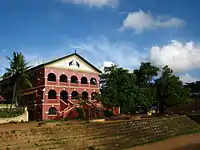
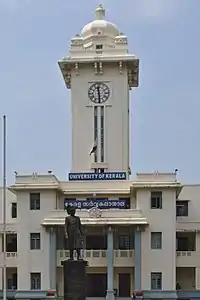
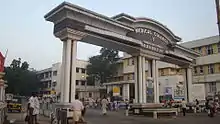

Primary and secondary education
Schools in Thiruvananthapuram are classified as aided, unaided and Government schools.[201][202] The government schools are run directly by the Kerala State Education Board and follow the syllabus prescribed by the state government.[203] The aided schools also follow the state syllabus. Malayalam and English are the primary languages of instruction; Tamil and Hindi are also used.[203] The schools are affiliated with The State Council of Educational Research and Training (SCERT), Central Board of Secondary Education (CBSE), Indian Certificate of Secondary Education (ICSE), International General Certificate of Secondary Education (IGCSE) and National Institute of Open Schooling (NIOS). In the National Achievement Survey conducted by the National Council of Educational Research and Training (NCERT), Thiruvananthapuram is ranked as the best city in Kerala.[204][205]
The notable schools in the city include St. Mary's Higher Secondary School, which is considered one of the largest schools in Asia, with the total number of students exceeding 12,000,[206][207] Government Model Boys Higher Secondary School, Government Higher Secondary School for Girls, Holy Angel's Convent Trivandrum, SMV School, Trivandrum International School, Chinmaya Vidyalayas, Kendriya Vidyalaya, Loyola School, Christ Nagar School, Thiruvananthapuram, Sarvodaya Vidyalaya, Nirmala Bhavan Higher Secondary School, Arya Central School, Jyothi Nilayam School, St. Joseph's Higher Secondary School, St. Thomas Residential School, The Oxford School and VSSC Central School.[208]
Higher education and research
Thiruvananthapuram is a major educational and research hub with various institutions in the fields of space science, information technology, physical science, biotechnology, engineering and medicine. There are three universities in Thiruvananthapuram: two state universities and one deemed university. The state universities are the University of Kerala and APJ Abdul Kalam Technological University. Indian Institute of Space Science and Technology (IIST), is a government-aided institute and deemed university.[209] IIST is the first of its kind in the country, to offer graduate courses and research in space sciences, space technology and space applications.[210] The city also houses two Institutes of National Importance; Sree Chitra Tirunal Institute for Medical Sciences and Technology (SCTIMST) and Indian Institute of Science Education and Research (IISER).[211] Thiruvananthapuram is one of the regional headquarters of Indira Gandhi National Open University (IGNOU).[212]
The Government Medical College, Thiruvananthapuram is the first and a premier medical school in Kerala, founded in 1951.[213] Other notable medical schools apart from SCTIMST (which provides super-specialty courses in cardiac and neuroscience) and Regional Cancer Centre, Thiruvananthapuram (which provides PG courses in radiotherapy and pathology, and super-specialty courses) includes SUT Academy of Medical Sciences, Sree Gokulam Medical College and Government Ayurveda College.[214]
The city houses several prominent legal education institutions. The Government Law College, formed in 1875, is one of the oldest legal education institutions in India.[215] The Kerala Law Academy is another major legal education institution.[216] The major Business schools include Asian School of Business, CET School of Management and Institute of Management in Kerala (IMK).[217][218][219] There are over 23 engineering education institutions in Thiruvananthapuram.[220] Apart from IIST and IISER, the other major engineering education institutions include College of Engineering, Trivandrum (CET), which is the first engineering college in Kerala,[221] Government Engineering College BartonHill (GEC), Sree Chitra Thirunal College of Engineering (SCT), ER & DCI Institute of Technology, University College of Engineering, Mohandas college of Engineering and Technology and Mar Baselios College of Engineering and Technology.[220] The University College Thiruvananthapuram established in 1866 and H.H. The Maharaja's College for Women established in 1864 are two of the oldest institutions of higher education in India.[222][223]
Other prominent undergraduate and postgraduate colleges include the Government Arts College, Mahatma Gandhi College, Mar Ivanios College, Government Sanskrit College, Loyola College of Social Sciences, St. Xavier's College and All Saints College.[224] Major fine arts colleges are Swathi Thirunal College of Music, which is the first music academy in Kerala[225] and College of Fine Arts Trivandrum.[226] The Lakshmibai National College of Physical Education is one of the two physical education academic institutes of the Sports Authority of India (SAI).[227]
The premier research institutes in Thiruvananthapuram include: Indian Institute of Information Technology and Management, Kerala (IIITMK),[228] National Institute of Speech and Hearing (NISH),[229] Rajiv Gandhi Centre for Biotechnology,[230] Centre for Development of Imaging Technology (C-Dit),[231] Centre for Development Studies (CDS),[232] Jawaharlal Nehru Tropical Botanic Garden and Research Institute,[233] National Centre for Earth Science Studies (NCESS),[234] Centre for Development of Advanced Computing (C-DAC)[235] and Oriental Research Institute & Manuscripts Library.[236]
Kerala University is ranked as the best university in Kerala according to the MHRD's National Institutional Ranking Framework (NIRF).[237] Kerala University also ranked top in overall institution rankings in Kerala.[238] In engineering, Indian Institute of Space Science and Technology (IIST) is ranked as the best in Kerala and College of Engineering, Trivandrum (CET) is ranked third in Kerala.[239] College of Engineering, Trivandrum is also ranked fourth in India and first in Kerala in architecture institution rankings.[240] The University College is listed as the best college in Kerala.[241][242]
Media
Thiruvananthapuram has numerous newspaper publications, television and radio stations. Most of the media houses in Kerala are based in Thiruvananthapuram. The first Malayalam channel, Doordarshan Malayalam began broadcasting from the city in 1981.[243] Asianet, the first private channel in Malayalam, also started its telecasting from the city in 1993.[244] The other Malayalam channels based in the city include Asianet News, Amrita TV, Kappa TV, Kairali TV, Kairali We, Mathrubhumi News, Kaumudy TV, JaiHind TV, News18 Kerala and People TV.[245] All major Malayalam channels, including Asianet, Janam TV, Jeevan TV, MediaOne TV and Manorama News have production facilities or offices in the city.[245] TV channels are accessible via cable subscription, direct-broadcast satellite services, or internet-based television.[246][247][248] Prominent Direct-to-Home (DTH) entertainment services in Thiruvananthapuram include Sun Direct DTH, DD Direct+, Videocon d2h, Dish TV, Reliance Digital TV, Airtel digital TV and Tata Play.
Major Malayalam newspapers available are Mathrubhumi, Malayala Manorama, Kerala Kaumudi, Deshabhimani, Madhyamam, Janmabhumi, Chandrika, Thejas, Siraj Daily, Deepika and Rashtra Deepika. The English language newspapers with editions from Thiruvananthapuram are The New Indian Express, The Hindu, The Deccan Chronicle and The Times of India.[245]
All India Radio, the national state-owned radio broadcaster, airs Medium wave and Shortwave radio stations in the city.[249][250] The Vividh Bharati of All India Radio also airs an FM radio station known as Ananthapuri FM.[251][252] Other FM radio channels broadcast from Thiruvananthapuram are Big FM 92.7 MHz,[253] Club FM 94.3 MHz,[254] Radio Mirchi 98.3 MHz,[255] Red FM 93.5 MHz[253] and Radio DC 90.4 MHz.[256]
Sports
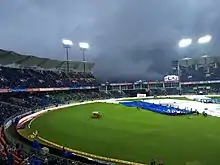
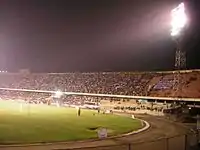

The most popular sports in Thiruvananthapuram are cricket and football. The city hosted the first international cricket match in Kerala at the University Stadium in 1984.[257] The city also hosted the first Twenty20 International cricket match in Kerala.[258] The Kerala Cricket Association is headquartered in Thiruvananthapuram.[259] Prominent cricketers from Thiruvananthapuram include Sanju Samson, Raiphi Gomez, Ryan Ninan, Aneil Nambiar, K. N. Ananthapadmanabhan, Rohan Prem, Udiramala Subramaniam, P. M. K. Mohandas, Bhaskar Pillai and Padmanabhan Prasanth. The Sports Hub, University Stadium,[260] St Xavier's College Ground,[261] KCA Cricket Stadium Mangalapuram,[262] Medical College ground[263] and Vellyani Agricultural College Ground[264] are the main cricket grounds in the city. The Sports Hub, Trivandrum, commonly known as Greenfield Stadium is one of the largest cricket and football stadiums in India.[265] Thiruvananthapuram hosted the 2015 SAFF Championship at the Greenfield Stadium.[266] SBI Kerala, Titanium FC, KSEB, Kovalam FC and Travancore Royals FC are the major football clubs based in Thiruvananthapuram.[267][268] Football is usually played in the Greenfield International Stadium(The Sports Hub), Chandrasekharan Nair Stadium and University Stadium.[269] Prominent football players from Thiruvananthapuram include Jobby Justin, Vinu Jose, Thomas Sebastian, M Rajeev Kumar and Ganeshan.
The city has facilities to host most types of sports.[270] Thiruvananthapuram was one of the main venues for the 2015 National Games of India.[271] Athletic competitions are usually held at the University Stadium, Chandrasekharan Nair Stadium and Central Stadium.[272] The Trivandrum Marathon is a marathon organised by the Trivandrum runners club every year.[273] There will be two main races; a half marathon of 21 km and a full marathon of 42.19 km. A special 2 km fun run is also organised for public participation.[274] Trivand Run is another marathon conducted every January in the city.[275]
Jimmy George Indoor Stadium is a major indoor stadium in the state. It is used for conducting basketball, volleyball, table tennis, gymnastics, aquatics and martial arts.[270] The stadium has the first altitude-simulated training facility in South India, known as Astra.[276] The major sports training and coaching institutions include the Lakshmibai National College of Physical Education (LNCPE), TOSS Academy and the Tenvic Sports Coaching Academy at the Sports Hub.[277]
Basketball tournaments are usually conducted by the schools in the city.[278] Thiruvananthapuram hosted the 61st National Shooting Championship at the Vattiyoorkavu Shooting Range.[279] Surfing is also a popular sport on the beaches. Many surfing and standup paddleboarding tournaments are held in the city.[280] The surf competitions are usually held on Kovalam Beach and Varkala Beach.[281] Paragliding is another adventure sport usually seen on Varkala Beach.[282]
The SAI Trivandrum golf club, established in 1850, is one of the oldest golf courses in India.[283] It is leased to the Sports Authority of India.[283]
See also
- List of people from Thiruvananthapuram
References
- "History – Official Website of District Court of India". District Courts. Archived from the original on 25 December 2018. Retrieved 18 May 2017.
- "India: 21-year-old student Arya Rajendran set to become mayor in Kerala". gulfnews.com. Retrieved 25 December 2020.
- "Thiruvananthapuram Corporation General Information". Corporation of Thiruvananthapuram. Archived from the original on 30 December 2020.
- "Demographia World Urban Areas" (PDF). demographia.com. Archived (PDF) from the original on 5 August 2011.
- "Urban Agglomerations/Cities having population 1 million and above" (PDF). Office of the Registrar General & Census Commissioner. Ministry of Home Affairs, Government of India. Retrieved 9 July 2018.
- "Ramzan turns Kerala into a foodies' paradise". Times of India. 23 June 2017. Retrieved 9 July 2018.
- "The Kerala Official Language (Legislation) Act, 1969" (PDF). PRS Legislative Research. Retrieved 19 July 2018.
- "Thiruvananthapuram | India". Encyclopedia Britannica. Retrieved 7 September 2020.
- "Kerala Economic Review". Government of Kerala. Kerala State Planning Board. Archived from the original on 20 July 2020. Retrieved 1 March 2018.
- "Kunhalikutty to lay foundation stone for Technopark tomorrow". Technopark. 24 February 2016.
- "Thiruvananthapuram India". Destination 360. Retrieved 18 June 2010.
- Kapoor, Subodh (2002). The Indian encyclopaedia : biographical, historical, religious, administrative, ethnological, commercial and scientific. New Delhi: Cosmo Publications. ISBN 8177552570.
- Sreedhara Menon, A (2011). Kerala History and its Makers. D C Books. p. 35. ISBN 9788126437825. Retrieved 9 July 2018.
- Boland-Crewe, Tara; Lea, David (2003). The Territories and States of India. Routledge. ISBN 9781135356255.
- Shungoony Menon, P. (1878). A History of Travancore from the Earliest Times (pdf). Madras: Higgin Botham & Co. pp. 162–164. Retrieved 5 May 2016.
- Abram, David; Edwards, Nick (2003). The Rough Guide to South India. Rough Guides. p. 306. ISBN 9781843531036. Retrieved 9 July 2018.
- "Thiruvananthapuram: One of the South's Hottest IT Hubs-DQWeek". www.dqweek.com. Retrieved 20 December 2017.
- Prasanna, Laxmi (23 November 2016). "With centres nod, foundation stone laid for KINFRA's second phase IT/ ITES Park in Thiruvananthapuram". The Times of India. Retrieved 28 March 2018.
- "Thiruvananthapuram best Kerala city to live in: Times survey". The Times of India. Retrieved 5 August 2016.
- "India's Best Cities: Winners and Why they made it". India Today. 22 February 2013. Retrieved 27 March 2013.
- "Thiruvananthapuram is the best city in India:Survey". The New Indian Express. 2 March 2017. Retrieved 6 June 2020.
- "Delhi, Mumbai not the best in urban governance, Thiruvananthapuram first". Hindusthan Times. HT Media Limited. 28 February 2017. Retrieved 17 May 2017.
- "About Thiruvananthapuram". Thiruvananthapuram Municipal Corporation. Archived from the original on 18 September 2010. Retrieved 29 October 2010.
- "Swati manuscripts found". The Hindu. Retrieved 3 August 2016.
- Balid, Vivek; Chatterji, Miabi; Reddy, Sujani; Vimalassery, Manu (2013). The sun never sets : South Asian migrants in an age of U.S. power. New York: NYU Press. p. 122. ISBN 978-0814786437.
- De Beth Hillel, David (1832). Travels (Madras publication).
- Lord, James Henry (1977). The Jews in India and the Far East; Greenwood Press Reprint; ISBN 0-8371-2615-0.
- The Business Directory, Kerala. National Publishers. 1972. p. 45.
- The March of India, Volume 15, Issues 1–9. Publications Division, Ministry of Information and Broadcasting. 1963.
- "Ancient Trade in Thiruvananthapuram". About Thiruvananthapuram. Technopark Kerala. Archived from the original on 3 October 2006. Retrieved 17 October 2006.
- Subramanian, T. S (28 January 2007). "Roman connection in Tamil Nadu". The Hindu. Archived from the original on 19 September 2013. Retrieved 28 October 2011.
- KA Nilakanta Sastri
- Woodcock, George (1967). Kerala: a portrait of the Malabar coast. Faber & Faber. p. 65. Retrieved 24 June 2018.
- Mathew, K S (2016). Imperial Rome, Indian Ocean Regions and Muziris: New Perspectives on Maritime Trade. Taylor & Francis. p. 27. ISBN 978-1351997522. Retrieved 9 July 2018.
- Nayar, K Balachandran (1974). In Quest of Kerala: Geography, places of interest, political history, social history, literature. Accent Publications. p. 26. Retrieved 9 July 2018.
- Babu George, Sarath (27 July 2015). "Vizhinjam in historical perspective". The Hindu. Retrieved 9 July 2018.
- Mahadevan, G (6 May 2014). "Shedding light on Vizhinjam's golden past". The Hindu. Retrieved 9 July 2018.
- Proceedings – Indian History Congress. Indian History Congress. 1987. p. 187. Retrieved 9 July 2018.
- Haridas, Aathira (17 April 2018). "Chronicles of Kanthalloor Sala which got lost in the mists of time". The Times of India. Retrieved 9 July 2018.
- Roy, Kaushik (2015). Military Manpower, Armies and Warfare in South Asia. Routledge. ISBN 9781317321279. Retrieved 9 July 2018.
- Sreedhara Menon, A. (2007). A Survey of Kerala History (2007 ed.). Kottayam: DC Books. ISBN 9788126415786.
- Karashima, Noburu. 2014. 'The Fall of the Old States', in A Concise History of South India: Issues and Interpretations, ed. Noburu Karashima, pp. 172–73. New Delhi: Oxford University Press.
- "Pandya dynasty | Indian dynasty". Encyclopedia Britannica. Retrieved 21 September 2017.
- Keay 2011, p. 215.
- Majumdar (contains no mention of Maldives)
- Ganesh, K.N. (June 2009). "Historical Geography of Natu in South India with Special Reference to Kerala". Indian Historical Review. 36 (1): 3–21. doi:10.1177/037698360903600102. ISSN 0376-9836. S2CID 145359607.
- "Kerala's Tamil Connection". The New Indian Express. 26 June 2010.
- Travancore State Manual
- "History". District Administration Thiruvananthapuram. National Informatics Centre, Ministry of Electronics & Information Technology, Government of India. Retrieved 19 July 2018.
- Thiruvananthapuram at the Encyclopædia Britannica
- Gauri Lakshmi Bayi, Aswathi Thirunal (1998). Sreepadmanabhaswami Kshetram. Thiruvananthapuram: The State Institute Of Languages. pp. 152–168. ISBN 978-81-7638-028-7.
- "About Corporation". Govt. of Kerala. Retrieved 17 May 2017.
- "History of legislative bodies in Kerala-- Sri Mulam Popular Assembly". Keralaassembly. Retrieved 17 May 2017.
- "Kowdiar palace". About Kowdiar palace. Zonkerala. Retrieved 25 June 2010.
- "Thiruvananthapuram Municipal Corporation". Thiruvananthapuram Municipal Corporation Introduction. Thiruvananthapuram Corporation, Government of Kerala. Archived from the original on 16 September 2010. Retrieved 3 January 2011.
- "A Brief History of the University". University of Kerala. Retrieved 17 May 2017.
- West Bengal National University of Juridical Sciences (2002). Criminal Justice India Series: Kerala, 2001. Allied Publishers. p. 5. ISBN 978-81-7764-391-6.
- "The Movement for a United (Aikya) Kerala". State Portal of Kerala. Information & Public Relations Department, Kerala State IT Mission (KSITM), Government of Kerala. Retrieved 19 July 2018.
- "VSSC Thiruvananthapuram". Indian Space Research Organisation. Archived from the original on 26 April 2006. Retrieved 23 May 2006.
- "First IT Park in Kerala". Kerala State IT Mission. Archived from the original on 3 January 2021. Retrieved 25 August 2006.
- The digital challenge: information technology in the development context. S. Krishna, Shirin Madon by Ashgate Publishing, Ltd. 2003. p. 350. ISBN 9780754634454.
- "Technopark bags high CRISIL rating". The Hindu. Special Correspondent. 29 July 2020. ISSN 0971-751X. Retrieved 7 September 2020.
{{cite news}}: CS1 maint: others (link) - David Abram; Rough Guides (Firm); Nick Edwards (2005). The Rough Guide to South India. Rough Guides. p. 261. ISBN 978-1-84353-103-6.
- "Thiruvananthapuram, India Page". Falling Rain Genomics, Inc. Retrieved 19 March 2008.
- "Rainfall Stations in India". Indian Institute of Tropical Meteorology (Pune). Archived from the original on 16 January 2009. Retrieved 18 June 2010.
- Seismic zoning map of India (Map). Geological Survey of India. Archived from the original on 15 May 2013. Retrieved 1 July 2010.
- Kapoor, Subodh (2002). The Indian encyclopaedia : biographical, historical, religious, administrative, ethnological, commercial and scientific (1st ed.). Cosmo Publications. p. 318. ISBN 9788177552577.
- "Soil types in Kerala". Kerala Agriculture. Retrieved 17 May 2017.
- "List of Urban Agglomerations of 2011 Census". Government of Kerala. Retrieved 17 May 2017.
- "Southern Air Command Introduction". Southern Air Command. Archived from the original on 25 January 2018. Retrieved 17 May 2017.
- "Thiruvananthapuram Climate". Weatherbase. Retrieved 25 August 2006.
- "Extremes of Temperature & Rainfall for Indian Stations (Up to 2012)" (PDF). India Meteorological Department. December 2016. p. M1110. Archived from the original (PDF) on 5 February 2020. Retrieved 29 February 2020.
- "Station: Thiruvananthapuram Climatological Table 1981–2010" (PDF). Climatological Normals 1981–2010. India Meteorological Department. January 2015. pp. 739–740. Archived from the original (PDF) on 5 February 2020. Retrieved 29 February 2020.
- "Table 3 Monthly mean duration of Sun Shine (hours) at different locations in India" (PDF). Daily Normals of Global & Diffuse Radiation (1971–2000). India Meteorological Department. December 2016. p. M-3. Archived from the original (PDF) on 5 February 2020. Retrieved 1 March 2020.
- "Climate & Weather Averages in Thiruvananthapuram, Kerala, India". Time and Date. Retrieved 19 July 2022.
- "Normals Data: Thiruvananthapuram – India Latitude: 8.48°N Longitude: 76.95°E Height: 59 (m)". Japan Meteorological Agency. Archived from the original on 29 February 2020. Retrieved 29 February 2020.
- "Climate and monthly weather forecast Thiruvananthapuram, India". Weather Atlas. Retrieved 13 June 2022.
- "Population by Religious Community". Census of India. Archived from the original on 13 September 2015. Retrieved 28 March 2018.
- "Provisional Population Totals, Census of India 2011" (PDF). Census of India. Retrieved 5 December 2017.
- "Population census 2011". Census of India 2011, Government of India. Retrieved 6 December 2011.
- "Thiruvananthapuram City Census 2011 data". Census2011. Retrieved 5 December 2017.
- Study of urban poor in TMC area (PDF). JNNURM (Report). Archived from the original (PDF) on 27 January 2011. Retrieved 9 November 2010.
- "Migrants assured of safety". The Hindu. 11 October 2017. Retrieved 5 December 2017.
- "Administration". Thiruvananthapuram Corporation. Retrieved 24 January 2018.
- "Institutional Setup of Corporation of Thiruvananthapuram". Thiruvananthapuram Corporation. Information Kerala Mission. Retrieved 24 January 2018.
- "Organisation Structure" (PDF). Thiruvananthapuram Corporation. Archived from the original (PDF) on 24 January 2018. Retrieved 24 January 2018.
- "Zonal Operations". Thiruvananthapuram Corporation. Information Kerala Mission. Retrieved 24 January 2018.
- "About Thiruvananthapuram Development Authority". Thiruvananthapuram Development Authority. Information Kerala Mission. Retrieved 24 January 2018.
- "Constituencies". Corporation of Trivandrum. Information Kerala Mission. Retrieved 24 January 2018.
- "Governance of District Police, Thiruvananthapuram City". District Police Office, Thiruvananthapuram City. State Police Computer Centre. Retrieved 24 January 2018.
- "Work study report on Police Department" (PDF). Government of Kerala. Retrieved 24 January 2018.
- "Prisons Headquarters Poojappura". Kerala prisons and correctional services. Government of India, Ministry of Communications and Information Technology. Retrieved 24 January 2018.
- "Southern Air Command Introduction". Official Home Page of Indian Air Force. Indian Air Force. Archived from the original on 25 January 2018. Retrieved 24 January 2018.
- "Schoolchildren get a 'Command'ing view". The New Indian Express. 20 January 2018. Retrieved 24 January 2018.
- "Armed Police Head Quarter". Kerala Police. State Police Computer Centre, SCRB, Thiruvananthapuram. Retrieved 24 January 2018.
- G, Ananthakrishnan (22 July 2012). "CRPF religion head count". The Telegraph. Retrieved 24 January 2018.
- "Up-close look at military weapons". The Hindu. 17 August 2016. Retrieved 24 January 2018.
- "UAE Consulate Thiruvananthapuram Kerala". Consulate of United Arab Emirates. Retrieved 24 January 2018.
- "Consulate of Maldives". Consulate of Maldives in Thiruvananthapuram. Netindia. Retrieved 24 January 2018.
- "Honorary Consul of Sri Lanka". Consulate of Sri Lanka in Kerala. Retrieved 24 January 2018.
- "City needs special zone for diplomatic missions". The Hindu. 7 December 2016. Retrieved 24 January 2018.
- "Thiruvananthapuram Water Supply". Thiruvananthapuram Smart City. Municipal Corporation of Thiruvananthapuram. Retrieved 24 January 2018.
- "Renovation on at KWA pumping stations". The Hindu. 25 March 2014. Retrieved 24 January 2018.
- "Wellington Water Works an example of far-sightedness". The Hindu. 31 March 2010. Retrieved 24 January 2018.
- B. Nair, Rajesh (31 August 2013). "Sludge disposal poses a hurdle at Muttathara sewage treatment plant". The Hindu. Retrieved 24 January 2018.
- "Waste water Management". Smartcity Thiruvananthapuram. C-DIT. Retrieved 24 January 2018.
- "Sewerage Scheme (Thiruvananthapuram) Phase – I". Department of Economic Affairs, Ministry of Finance, Government of India. Retrieved 24 January 2018.
- "KSEB commissions substation". The Times of India. 25 July 2015. Retrieved 24 January 2018.
- "Trivandrum to get modern fire fighting equipment for faster aid". The New Indian Express. 22 July 2017. Retrieved 24 January 2018.
- "Thiruvananthapuram economy". Smart City Thiruvananthapuram. C-DIT Government of Kerala. Retrieved 1 March 2018.
- "AlphaWise City Vibrancy Index: A Guide to India's Urbanization" (PDF). Morgan Stanley. p. 7. Archived from the original (PDF) on 22 November 2011. Retrieved 1 March 2018.
- "Vikram Sarabhai Space Centre (VSSC)". Indian Space Research Organisation. Department of Space, Government of India. Retrieved 1 March 2018.
- "ISRO Centres". Indian Space Research Organisation. Department of Space, Government of India. Retrieved 1 March 2018.
- Chandran, Cynthia (22 December 2017). "Central Industrial Security Force to take over BrahMos security". Deccan Chronicle. Retrieved 1 March 2018.
- "Kunhalikutty to lay foundation stone for Technopark tomorrow". Technopark. 24 February 2016.
- "Companies in Technopark". Technopark. Technopark. Retrieved 1 March 2018.
- "Technopark becomes largest IT park in the country". Economic Times. 17 January 2014. Retrieved 1 March 2018.
- "Kinfra Parks". Kerala Industrial Infrastructure Development Corporation. Government of Kerala. Retrieved 1 March 2018.
- "Film city plan on fast track". The Hindu. 26 January 2018. Retrieved 1 March 2018.
- "Boost for Life Sciences Park development". The Hindu. 6 November 2017. Retrieved 1 March 2018.
- S, Unnikrishnan (1 February 2018). "Technopark: Riding smoothly into the future". The New Indian Express. Retrieved 1 March 2018.
- Tourism statistics 2007 (PDF). Tourism Department, Kerala (Report). Retrieved 8 May 2008.
- Radhakrishnan, S Anil (7 February 2018). "Good news for tourism sector". The Hindu. Retrieved 1 March 2018.
- Destination wise foreign tourist visits (PDF). Kerala Tourism (Report). Retrieved 4 August 2016.
- "Brainstorming for sustainable tourism". The New Indian Express. 27 September 2017. Retrieved 1 March 2018.
- Saikiran, KP (7 August 2017). "Realty sees a surge in Kerala". The Times of India. Retrieved 1 March 2018.
- "Vizhinjam International Transhipment Deepwater Multipurpose Seaport". VIZL. Retrieved 1 March 2018.
- "Vallarpadam Port loses out to Colombo on smaller draft, higher charges". Hellenic Shipping News. 26 February 2018. Retrieved 1 March 2018.
- Tharoor, Shashi (13 July 2015). "A Kerala Port with Adani. Why That's a Good Thing". NDTV. Retrieved 1 March 2018.
- Rajwi, Tiki (1 June 2017). "Sailing ahead". The New Indian Express. Retrieved 1 March 2018.
- "Temples' riches". The Economist. February 2013. Retrieved 5 August 2016.
- "Timeless built heritage". The Hindu. 11 June 2011. Retrieved 28 March 2018.
- "Agasthyamala". UNESCO. United Nations Educational, Scientific and Cultural Organization. Retrieved 28 March 2018.
- Desk, OLM (17 May 2017). "The Evergreen City of India". Outlook Money. Retrieved 15 December 2017.
- "The Monarch musician". The Hindu. 27 December 2013. Retrieved 7 December 2017.
- "Raja Ravi Varma: The father of Modern Indian Art". India Today. 28 April 2017. Retrieved 7 December 2017.
- India, Office of the Registrar General; Narayanan, Krishnaswamy (1973). Census of India, 1971: Series 9: Kerala, Part 6, Issue 1. University of Michigan: Manager of Publications – India. p. 21.
- "Ulloor S. Parameswara Iyer". Kerala Sahitya Akademi website (in Malayalam). Kerala Sahitya Akademi. Retrieved 7 December 2017.
- Talk of the Town. Penguin Books India, 2008. 2008. p. 130. ISBN 9780143330134.
- "Thiruvananthapuram Hosts Kovalam Literary Fest". Kerala Tourism. Retrieved 12 December 2017.
- Keralalibrary (25 September 2017). "Kerala's 188 Years Old Library Is All Set To Become Blind-Friendly". Outlook Web Bureau. Retrieved 12 December 2017.
- "Department of Library and Information Science". Kerala University. Retrieved 12 December 2017.
- S. Nair, Achuthsankar (14 October 2015). "Music and Thiruvananthapuram". The Hindu. Retrieved 12 December 2017.
- K, Radhakrishnan (23 November 2016). My Odyssey: Memoirs of the Man behind the Mangalyaan Mission. Penguin UK. ISBN 9789385990380.
- "Soorya festival set to begin today". The Hindu. 1 November 2016. Retrieved 12 December 2017.
- "111-day Surya festival begins today". The Times of India. 20 September 2017. Retrieved 12 December 2017.
- Srivastava, Manoj (2017). Wide Angle: History of Indian Cinema. Notion Press. p. 130. ISBN 9781946280480.
- "J C Daniel". Archived from the original on 6 June 2009. Retrieved 23 April 2015.
- Oommen, M. A.; Varkey Joseph, Kumbattu (1991). Economics of Indian Cinema. University of California: Oxford & IBH Publishing Company. p. 30. ISBN 978-81-204-0575-2.
- Amal (18 February 2016). "11 Festivals You Will Find Only in Trivandrum!". EnteCity.com. Retrieved 21 February 2017.
- Cheerath, Bhawani (7 December 2017). "IFFK 2017: A celebration of cinema from across the globe". The Hindu. Retrieved 15 December 2017.
- "The Capital of cinema". The Hindu. Baiju Chandran. 28 November 2013. Retrieved 29 November 2017.
- "A week-long theatre extravaganza in Kerala capital". The Indian Express. 22 September 2017. Retrieved 15 December 2017.
- "Zoological Garden, Thiruvananthapuram". Kerala Culture. Department of Cultural Affairs, Government of Kerala. Retrieved 22 January 2018.
- "A film on the life and work of Laurie Baker". Architectural Digest. Retrieved 29 November 2017.
- Kumar, Aswin J (17 January 2018). "Review meeting of arrangements for Attukal pongala held". The Times of India. Retrieved 22 January 2018.
- "All set for beemapally uroos". The New Indian Express. 20 February 2017. Retrieved 22 January 2018.
- "Vettucaud church festival from Friday". The Hindu. 10 November 2015. Retrieved 22 January 2018.
- Ajai Prasanna, Laxmi (20 November 2013). "Sree Padmanabha Swamy temple fest begins". The Times of India. Retrieved 22 January 2018.
- "Onam celebration from Sept.12". The Hindu. 22 September 2016. Retrieved 22 January 2018.
- "Largest gathering of women". Guinness World Records. Retrieved 29 November 2017.
- Mary Koshy, Sneha; Fernandes, Janaki (26 February 2013). "In Kerala, a festival that marks the world's largest gathering of women". Retrieved 22 January 2018.
- "FILCA int'l film fest from Friday". The Times of India. Retrieved 29 November 2017.
- "Twice the fun". The Hindu. 29 November 2017. Retrieved 29 November 2017.
- "Water Princess' to bring awareness on water conservation". The New Indian Express. 26 November 2017. Retrieved 22 January 2018.
- UR, Arya (7 November 2017). "Authentic Kerala cuisine and ayurvedic massage bowl over Ind and NZ teams". The Times of India. Retrieved 22 January 2018.
- Stott, David (10 April 2014). Kerala Footprint Focus Guide (illustrated ed.). Footprint Travel Guides. pp. 41–43. ISBN 9781909268791.
- Sahadevan, Sajini (8 June 2017). "Meals on wheels". The Hindu. Retrieved 22 January 2018.
- "Private bus strike shows signs of failure". Kerala Kaumudi. No. 19 February 2018. Retrieved 3 March 2018.
- S, Anasooya (7 November 2017). "Thampanoor station is now a role model". The Times of India. Retrieved 3 March 2018.
- Radhakrishnan, S.Anil (23 September 2016). "New bus shelter for East Fort". The Hindu. Retrieved 3 March 2018.
- "Pre-paid auto drivers oppose fee for parking". The Hindu. 17 July 2017. Retrieved 3 March 2018.
- "App-based taxi service at rly station from tomorrow". The Times of India. 10 December 2017. Retrieved 3 March 2018.
- K, Krishnachand (22 August 2017). "New metro policy to affect Kazhakoootam-Kesavadasapuram stretch". The New Indian Express. Retrieved 3 March 2018.
- "Trivandrum Metro Features". Kerala Rapid Transit Corporation Limited. Government of Kerala. Retrieved 3 March 2018.
- "Mr Minister, prove charges or retract statement: TRDCL". 4 October 2017. Retrieved 3 March 2018.
- "Thiruvananthapuram City Road Improvement Project to tackle congestion". World Highways. Retrieved 3 March 2018.
- "Thiruvananthapuram City Road Improvement". IL&FS. Retrieved 3 March 2018.
- "2015 Global Road Achievement Awards Book of Winning Projects" (PDF). IL&FS. Retrieved 4 March 2018.
- "United Nations finds Kerala's road is a model". The Deccan Chronicle. 16 May 2016. Retrieved 3 March 2018.
- "Thiruvananthapuram City Road Improvement Project – The UN Recognition for achieving sustainable development goals" (PDF). ITNL International. TCRIP. Retrieved 3 March 2018.
- "Case 25 India Road Sector Thiruvananthapuram City Improvement" (PDF). UNECE. United Nations Economic Commission for Europe. Retrieved 3 March 2018.
- Radhakrishnan, S. Anil (26 July 2017). "Soil testing for Kazhakuttam flyover begins". The Hindu. Retrieved 3 March 2018.
- OpenStreetMap contributors (3 March 2018). "Trivandrum to Aralvaimozhi distance" (Map). "Trivandrum to Aralvaimozhi". Retrieved 3 March 2018.
{{cite map}}:|author=has generic name (help) - "State Highways in Kerala" (PDF). Kerala Public Works Department. Government of Kerala. Retrieved 19 July 2018.
- "Paid parking on M.G. Road from today". The Hindu. 6 November 2015. Retrieved 3 March 2018.
- Sathyendran, Nita (20 July 2017). "Ahead of the times". The Hindu. Retrieved 3 March 2018.
- UR, Arya (5 May 2017). "Green spaces that are the breathing lungs of Trivandrum". The Times of India. Retrieved 3 March 2018.
- "Thiruvananthapuram Division" (PDF). Southern Railway. Retrieved 4 March 2018.
- "Kochuveli railway terminal opened". The Hindu Business line. 30 March 2005. Retrieved 4 March 2018.
- "Thiruvananthapuram Central to be made a world-class station". The Hindu. 28 September 2016. Retrieved 4 March 2018.
- "Railway to give priority to Nemom terminal: Ashwani Lohani". The Times of India. 27 October 2017. Retrieved 4 March 2018.
- "Kerala celebrates 75th anniversary of civil aviation". The Hindu. 29 October 2010. Retrieved 4 March 2018.
- "Southern Air Command". Indian Air Force. Retrieved 5 March 2018.
- "Rajiv Gandhi Academy for Aviation Technology gets its wings back". The Times of India. 15 March 2017. Retrieved 4 March 2018.
- "Cruise ship arrives at Vizhinjam port". The Hindu. 27 September 2016. Retrieved 4 March 2018.
- "Master plan for Vizhinjam Seaport released". 31 May 2013. Retrieved 4 March 2018.
- Venugopal, P (5 July 2016). "Cruise terminal being planned at Vizhinjam". The Hindu. Retrieved 4 March 2018.
- "Immigration check-post facility for Vizhinjam". The Hindu. Press Trust of India. 19 November 2017. Retrieved 4 March 2018.
- Anilkumar, B S (4 October 2017). "A model for generations". The Times of India. Retrieved 8 March 2018.
- "No PSC postings in aided schools". 2 March 2017. Retrieved 5 March 2018.
- "List of Schools". General Education Department. Government of Kerala. Retrieved 5 March 2018.
- "Selected Educational Statistics" (PDF). General Education Department. Government of Kerala. Retrieved 5 March 2018.
- "National Achievement Survey". National Council of Educational Research and Training. Government of India. Retrieved 5 March 2018.
- "NCERT survey: Gaping holes visible in Kerala education system". The Times of India. 1 March 2018. Retrieved 5 March 2018.
- Pradeep Kumar, Kaavya (1 November 2014). "'Twin' fete at school to mark Kerala Piravi". The Hindu. Retrieved 5 March 2018.
- "A song for a better earth by 12,000 children". The Hindu. 23 May 2016. Retrieved 5 March 2018.
- "List of High schools in Thiruvananthapuram District" (PDF). General Education Department. Government of Kerala.
- "About Institute". Indian Institute of Space Science and Technology (IIST). Department of Space, Govt. of India. Retrieved 6 March 2018.
- "About IIST". Indian Institute of Space Science and Technology. Archived from the original on 14 August 2011. Retrieved 6 March 2018.
- "Institutions of National Importance". Department of Higher Education. Ministry of Human Resource Development (MHRD), Government of India. Retrieved 5 March 2018.
- "Welcome to Trivandrum Regional Centre". Indira Gandhi National Open University Website. Indira Gandhi National Open University. Retrieved 6 March 2018.
- "History of Medical College". Trivandrum Medical College. Government of Kerala. Retrieved 6 March 2018.
- "Professional College list". Office of the commissioner for entrance examinations. Government of Kerala. Retrieved 19 July 2018.
- "About Government Law College, Thiruvananthapuram". Government Law College, Thiruvananthapuram. GLCT. Retrieved 6 March 2018.
- "About Kerala Law Academy". Kerala Law Academy Website. Kerala Law Academy. Retrieved 6 March 2018.
- "CET School of Management". CET Management school. Department of Business Administration, Kerala. Retrieved 6 March 2018.
- "About". Asian School of Business. ASB. Retrieved 6 March 2018.
- "IMK". Institute of Management in Kerala. Kerala University. Retrieved 6 March 2018.
- "Kerala Technological University List of Affiliated Courses 2015–16" (PDF). APJ Abdul Kalam Technological University. Government of Kerala. Retrieved 6 March 2018.
- "About CET". College of Engineering, Trivandrum. CET. Retrieved 6 March 2018.
- "Home". University College, Thiruvananthapuram. Government of Kerala. Retrieved 6 March 2018.
- "Govt. College for Women, Our History". Government college for Women, Thiruvananthapuram. Government of Kerala. Retrieved 6 March 2018.
- "List of colleges affiliated to the University of Kerala" (PDF). Kerala University. Government of Kerala. Retrieved 6 March 2018.
- "About". Swathi Thirunal College of Music. C-DIT. Retrieved 6 March 2018.
- Zachariah, Preeti (8 February 2018). "Carving space through art". The Hindu. Retrieved 6 March 2018.
- "Regional Centres". Sports Authority of India. Ministry of Youth Affairs and Sports, Government of India. Retrieved 6 March 2018.
- "Indian Institute of Information Technology and Management – Kerala (IIITM-K)". Technopark. Government of Kerala. Retrieved 8 March 2018.
- "About us". National Institute of Speech and Hearing. Retrieved 8 March 2018.
- "RGCB Profile". Gandhi Centre for Biotechnology (RGCB). Retrieved 8 March 2018.
- "About Us". Centre for Development of Imaging Technology (C-DIT). Government of Kerala. Retrieved 19 July 2018.
- "An Overview". Centre for Development Studies (CDS). Retrieved 8 March 2018.
- "Experts brainstorm over ways to tackle viruses". The Hindu. 31 January 2018. Retrieved 6 March 2018.
- "Contact Directory". National Centre for Earth Science Studies. Earth System Science OrganizationMinistry of Earth Sciences, Government of India. Retrieved 8 March 2018.
- "Corporate Profile". Centre for Development of Advanced Computing (C-DAC). Ministry of Electronics and Information Technology, Government of India. Retrieved 8 March 2018.
- "Science festival at Kerala varsity". The Hindu. 14 February 2018. Retrieved 6 March 2018.
- "University Rankings". National Institutional Ranking Framework. Ministry of Human Resource Development, Government of India. Retrieved 25 May 2018.
- "Overall Ranking". National Institutional Ranking Framework. Ministry of Human Resource Development, Government of India. Retrieved 25 May 2018.
- "Engineering Rankings". National Institutional Ranking Framework. Ministry of Human Resource Development, Government of India. Retrieved 25 May 2018.
- "Architecture Rankings". National Institutional Ranking Framework. Ministry of Human Resource Development, Government of India. Retrieved 25 May 2018.
- "College Rankings". National Institutional Ranking Framework. Ministry of Human Resource Development, Government of India. Retrieved 25 May 2018.
- "University College joins the big league". The Hindu. 8 May 2018. Retrieved 25 May 2018.
- "Doordarshan Kendra, Thiruvananthapuram". Doordarshan Kendra Trivandrum. Prasar Bharathi, Government of India. Retrieved 9 March 2018.
- Mohandas, Vandana (14 November 2017). "The world's his oyster". The Deccan Chronicles. Retrieved 9 March 2018.
- "Media in Kerala Thiruvananthapuram". Official Kerala Government website. Government of Kerala. Retrieved 9 March 2018.
- "Competition Commission orders probe against Star India". The Hindu. 30 December 2017. Retrieved 9 March 2018.
- Philip, Anil (5 March 2018). "DDK Trivandrum ends analogue terrestrial TV transmission". Kerala IT News. Retrieved 9 March 2018.
- "BSNL launches IPTV in State". The Hindu. 12 March 2010. Retrieved 9 March 2018.
- "South Zone Region Services" (PDF). All India Radio. Prasar Bharati, Government of India. Retrieved 9 March 2018.
- "About All India Radio Trivandrum" (PDF). All India Radio, Trivandrum. Retrieved 9 March 2018.
- "Vividh Bharati FM Service" (PDF). All India Radio. Prasar Bharati, Government of India. Retrieved 9 March 2018.
- "Ananthapuri FM looking for anchors". The Hindu. 23 March 2017. Retrieved 9 March 2018.
- Sathyendran, Nita (16 January 2015). "Jest for laughs". The Hindu. Retrieved 9 March 2018.
- "Club FM". Club FM. Retrieved 6 March 2011.
- "Radio Mirchi Thiruvananthapuram". Entertainment Network (India) Limited. Retrieved 6 March 2011.
- "Radio DC Thiruvananthapuram". Radio DC. Retrieved 9 March 2018.
- K, Krishnachand (6 November 2017). "Thiruvananthapuram all set for T20 international cricket match". The Times of India. Retrieved 10 March 2018.
- "TVPM to host India-NZ T20 on November 7". Malayala Manorama. 3 August 2017. Retrieved 10 March 2018.
- "Contact us". Kerala Cricket Association. KCA. Retrieved 10 March 2018.
- "University Stadium". ESPN cricinfo. Retrieved 28 March 2018.
- "St Xavier's College Ground, Thumba". ESPN cricinfo. Retrieved 28 March 2018.
- "KCA Cricket Stadium – Mangalapuram". KCA Website. Kerala Cricket Association. Retrieved 28 March 2018.
- "Medical College Ground Profile". Cricketarchive. Retrieved 28 March 2018.
- "Vellyani Agricultural College Ground". ESPN cricinfo. Retrieved 28 March 2018.
- "Greenfield Stadium Touching New Heights". The New Indian Express. 12 June 2015. Retrieved 10 March 2018.
- Mohanarangan, Vinayakk (3 January 2016). "SAFF Cup final, as it happened: Chhetri the match-winner as India reclaim title from Afghans". Firstpost. Retrieved 10 March 2018.
- Chandran, M.R. Praveen (29 March 2016). "Titanium football club to turn professional; plans to establish fan club". The Hindu. Retrieved 10 March 2018.
- Chandran, M.R. Praveen (11 February 2018). "Back in the game: Kerala Blasters and the second football revolution in Kerala". The Hindu. Retrieved 10 March 2018.
- "Chirag United holds Salgaocar". The Hindu. 3 December 2011. Retrieved 28 March 2018.
- M, Athira (29 April 2016). "Come and play". The Hindu. Retrieved 28 March 2018.
- "Venues". 2015 National Games of India. Retrieved 27 March 2018.
- "University Stadium". National Games Kerala 2015. 35th National Games – Kerala 2015. Retrieved 27 March 2018.
- V N, Aswin (8 December 2017). "First-ever midnight marathon in Kerala". The Hindu. Retrieved 27 March 2018.
- "Trivandrum Marathon on December 9 midnight". The Times of India. 6 December 2017. Retrieved 27 March 2018.
- "Run to raise funds for cancer treatment". The Times of India. 8 January 2018. Retrieved 27 March 2018.
- "Astra". Sports Kerala. Retrieved 28 March 2018.
- "Junior badminton league on July 30 at Greenfield". The New Indian Express. 25 July 2017. Retrieved 28 March 2018.
- "Kazhakootam Sainik School wins basketball tournament". The Times of India. 30 October 2017. Retrieved 27 March 2018.
- "Information of NSF". The National Rifle Association of India. Retrieved 27 March 2018.
- "National surfing contest begins at Kovalam". The Hindu Businessline. 3 May 2013. Retrieved 27 March 2018.
- "Kovalam Surf Club: No school, no surfing". Kovalam Surf Club. Retrieved 27 March 2018.
- "5 Exquisite Places for your Next Solo Trip to South India!". News 18. 2 March 2018. Retrieved 28 March 2018.
- "History". SAI Trivandrum Golf Club. Sports Authority of India. Retrieved 27 March 2018.
Further reading
- The Indian encyclopaedia: biographical, historical, religious, administrative, ethnological, commercial and scientific. Archery-Banog, Volume 2. Genesis Publishing Pvt Ltd. 2002. p. 7063. ISBN 9788177552577.
- Heritage of Kerala, Thiruvananthapuram. Information & Public Relations Department, Government of Kerala, 2008. 2008. Retrieved 28 March 2018.
External links
- Official District website Archived 15 August 2019 at the Wayback Machine
- Government of Kerala Website on Thiruvananthapuram District
- List of Railway Stations in Trivandrum


